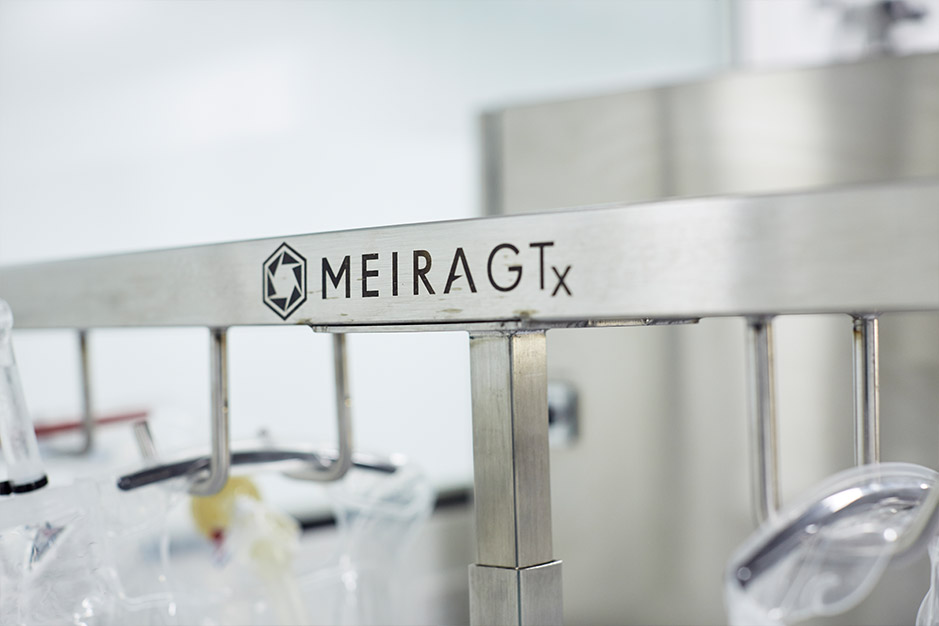Clinical Trials
Deep scientific and clinical understanding drive our approach to clinical development. Our strategy is to identify synergistic indications and to pursue treatments for conditions where there is a large unmet medical need and high potential for a meaningful benefit with genetic medicine.
Through our partnerships with leading institutions, we have gained significant clinical access, providing us with an understanding of disease impact and progress as well as providing an advantage in clinical trial enrollment. This access has allowed us to scale a clinical strategy across multiple programs while still maintaining our focus on therapies for individual patients.
Through the strength of our team, we strive each day to deliver on the promise of gene therapy, bringing potentially curative therapies to patients living with devastating diseases.

Ocular
The Lumeos Study is a Phase 3, Randomized, Controlled Study of AAV5-RPGR for the Treatment of X-linked Retinitis Pigmentosa Associated With Variants in the RPGR Gene. Botaretigene sparoparvovec (AAV5-RPGR), is designed to deliver functional copies of the RPGR gene to the subretinal space in order to help improve and preserve vision.
MeiraGTx has completed an open-label, dose-escalation Phase 1/2 clinical trial of AAV-RPGR in adult and pediatric patients with XLRP caused by mutations in RPGR open reading frame 15 (RPGR ORF15). The primary endpoint of this clinical trial is the safety of delivering AAV-RPGR through subretinal injection. Secondary endpoints include the outcomes of a range of functional tests and detailed structural analysis of the retina, including structural analysis of individual photoreceptors.
In 2020, MeiraGTx announced six, nine, and 12-month results from the dose escalation phase of the Phase 1/2 trial, with data demonstrating statistically significant improvement in retinal sensitivity and vision-guided mobility.
MeiraGTx is also conducting an ongoing natural history study in XLRP caused by mutations in RPGR ORF15. The study includes approximately 70 patients who will be followed for up to five years in order to collect structural and functional data.
An open label, dose escalation Phase 1/2 clinical trial of AAV-RPE65 in adult and pediatric patients with RPE65-deficiency is currently ongoing. The primary endpoint of this clinical trial is the safety of delivering AAV-RPE65 through subretinal injection. Secondary endpoints include the outcomes of a range of functional tests and detailed structural analysis of the retina.
MeiraGTx is also conducting an ongoing natural history study of patients with RPE65 deficiency in order to collect structural and function data.
MeiraGTx is currently conducting an open-label, dose-escalation Phase 1/2 clinical trial of AAV-CNGB3 in adult and pediatric patients with achromatopsia (ACHM) due to mutations in the CNGB3 gene. The primary endpoint of this clinical trial is the safety of delivering AAV-CNGB3 through subretinal administration. Secondary endpoints include the outcomes of a range of functional tests and detailed structural analysis of the retina, including structural analysis of individual photoreceptors.
MeiraGTx is also conducting an ongoing natural history study following over 90 patients with ACHM for up to five years to collect data on the structure and function of their eye.
MeiraGTx is currently conducting an open-label, dose-escalation Phase 1/2 clinical trial of AAV-CNGA3 in children aged 3-15 years old with achromatopsia (ACHM) due to mutations in the CNGA3 gene. The primary endpoint of this clinical trial is the safety of delivering AAV-CNGA3 via subretinal administration. Secondary endpoints include the outcomes of a range of functional tests and detailed structural analysis of the retina, including structural analysis of individual photoreceptors.
MeiraGTx is also conducting an ongoing natural history study following over 90 patients with ACHM for up to five years to collect data on the structure and function of their eye.
Salivary Gland
The AQUAx2 study is a clinical research study for people with dry mouth (xerostomia) caused by radiation therapy from previous head and neck cancer. The purpose of this study is to assess the efficacy and safety of a new investigational gene transfer study drug, called AAV2-hAQP1, at helping with dry mouth resulting from radiation damage to the parotid salivary glands.
The purpose of this study is to see if the investigational gene therapy, AAV2-hAQP1 (study drug), has an effect on the amount of saliva produced and on dry mouth symptoms, and to see if it is safe and well-tolerated in people with dry mouth as a result of receiving radiation therapy for head and neck cancer.
Find more information about this clinical trial at clinicaltrials.gov
We are currently conducting a Phase 1 dose escalation clinical trial in patients with grade 2 or 3 radiation-induced xerostomia (RIX) who remain cancer free for at least five years (or two years if HPV+) after receiving radiation treatment. The aim of the trial is to determine the safety of inserting the gene for the human aquaporin water channel (hAQP1) locally into the salivary glands of RIX patients and to measure changes in salivary flow resulting from the introduction of this channel.
The FDA granted orphan drug designation for AAV-AQP1 to treat symptoms of grade 2 and grade 3 late xerostomia from parotid gland hypofunction caused by radiotherapy for cancer of the oral cavity.
We are currently conducting the AQUAx clinical study to evaluate the safety of our investigational gene therapy AAV-hAQP1 and its potential to relieve symptoms of xerostomia. This multi-site Phase 1 clinical trial is enrolling participants who have been diagnosed with grade 2 or 3 radiation-induced xerostomia (RIX) and who have remained cancer free for at least five years (or two years if HPV+) after receiving radiation treatment for head and neck cancer.
Find more information about this clinical trial at clinicaltrials.gov.
Neurodegenerative Programs
The objective of this clinical trial is to evaluate the safety and tolerability of adeno-associated virus (AAV)-mediated delivery of glutamic acid decarboxylase (GAD) gene transfer into the subthalamic nuclei (STN) of participants with Parkinson’s Disease. The AAV-GAD trial is a three-arm randomized Phase 1 clinical bridging study with subjects randomized to one of two doses of AAV-GAD or sham control.
Find more information about this clinical trial at clinicaltrials.gov
